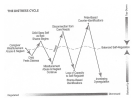Thank you for sharing your experiences and for giving so much substance to the experience of reading the book. Here I was thinking I had all my problems / traumas / issues nicely sorted out and labeled and put away for possible later reconsideration. Then I started reading “Inside the Criminal Mind” whilst listening to an audio version of “Healing Developmental Trauma”. At the same time I started Rolfing sessions and then one morning whilst brushing my teeth in slow motion, my mind followed the exercise ”Your Mother’s Eyes” as described in the audio version and the book. The exercise asks you to center yourself and bring up an image of your mother’s face and eyes and to track the emotional and physical response you experience.
It sounded so harmless and I ignored the advise to do this exercise with a partner and the hint that it might get quite evocative. The result was instant, both physical and emotional, and since that moment (about three weeks ago) I feel out of balance and stirred up.
Now I am rereading the book, I do not recommend the audio version or at least not as the sole version, the format doesn’t do the subject justice.
I take the book as an opportunity to be more honest to myself and to really take a look at what feelings and subjects I still have to integrate. I still can’t put a finger on which survival style(s) hit closest to home, but my inner resistance shows me, I might be on to something. What really helps me at the moment is Rolfing as I discover so many tensions in parts of my body that I wasn’t aware of and that influence my breathing, my posture (so far I am apparently not standing straight with my shoulders back), my movements and the perspective on things. At times I feel a bit / really overwhelmed, self-observation isn’t always easy but I am grateful for the recommendation of the book. As with everything it isn’t the only possible tool in the box but it is a very useful approach.
It sounded so harmless and I ignored the advise to do this exercise with a partner and the hint that it might get quite evocative. The result was instant, both physical and emotional, and since that moment (about three weeks ago) I feel out of balance and stirred up.
Now I am rereading the book, I do not recommend the audio version or at least not as the sole version, the format doesn’t do the subject justice.
I take the book as an opportunity to be more honest to myself and to really take a look at what feelings and subjects I still have to integrate. I still can’t put a finger on which survival style(s) hit closest to home, but my inner resistance shows me, I might be on to something. What really helps me at the moment is Rolfing as I discover so many tensions in parts of my body that I wasn’t aware of and that influence my breathing, my posture (so far I am apparently not standing straight with my shoulders back), my movements and the perspective on things. At times I feel a bit / really overwhelmed, self-observation isn’t always easy but I am grateful for the recommendation of the book. As with everything it isn’t the only possible tool in the box but it is a very useful approach.

 .
.  )
) and have big expectations especially because of my disorder.
and have big expectations especially because of my disorder. , I still sometimes feel/think the same like I was a child.
, I still sometimes feel/think the same like I was a child.